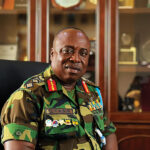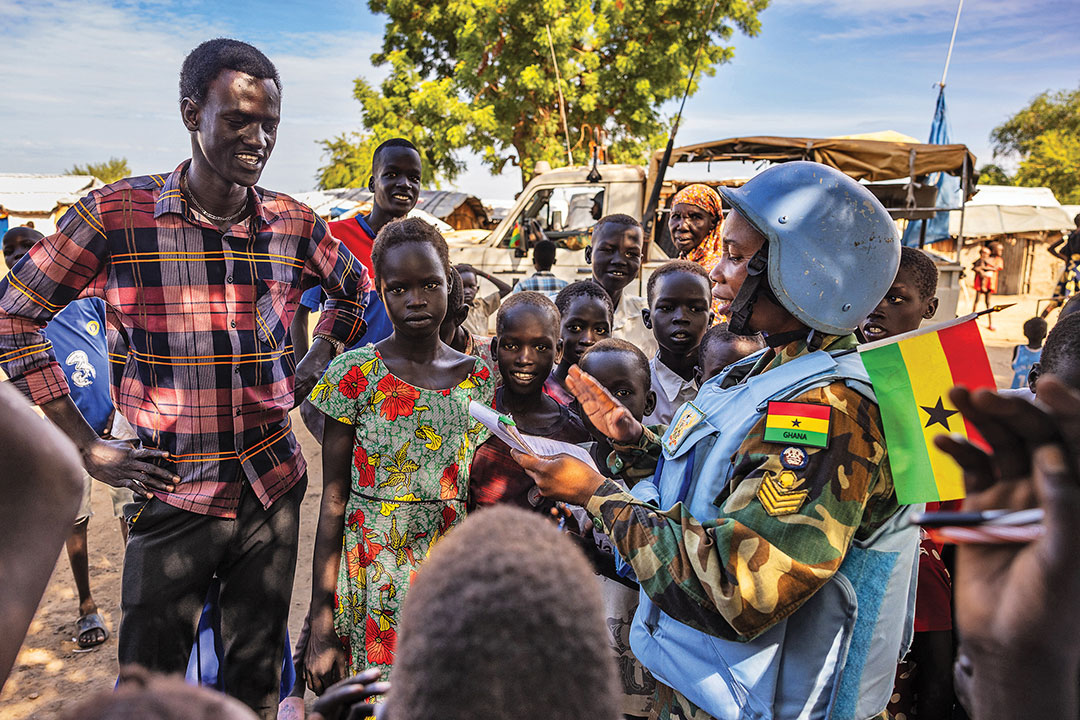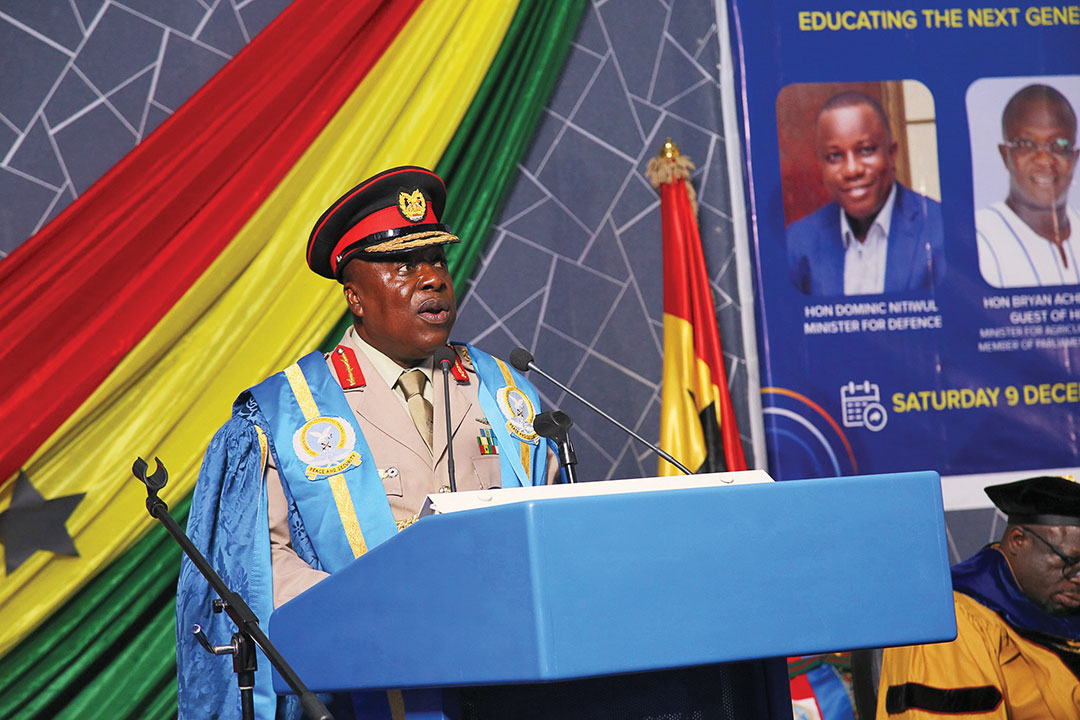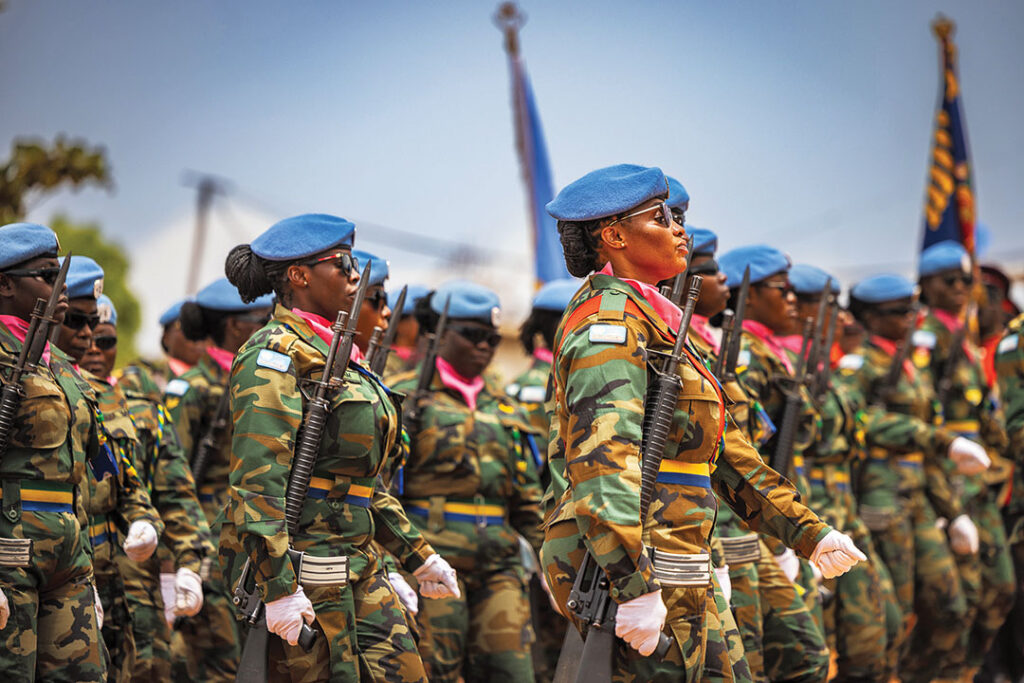 During more than 30 years in the military, Maj. Gen. Gyane has held key positions in the Ghana Armed Forces, including commanding officer Base Workshop, Burma Camp; commanding officer Army Headquarters; director of Army Logistics; acting director of Army Administration; and director-general of plans, research and development at General Headquarters. He has served in United Nations peacekeeping missions in Lebanon, the Democratic Republic of the Congo and Western Sahara. He served in the U.N. and Economic Community of West African States (ECOWAS) missions in Sierra Leone. In 2022, he was appointed commandant of the Kofi Annan International Peacekeeping Training Centre (KAIPTC). He spoke to ADF by videoconference from his office in Accra. This interview has been edited for space and clarity.
During more than 30 years in the military, Maj. Gen. Gyane has held key positions in the Ghana Armed Forces, including commanding officer Base Workshop, Burma Camp; commanding officer Army Headquarters; director of Army Logistics; acting director of Army Administration; and director-general of plans, research and development at General Headquarters. He has served in United Nations peacekeeping missions in Lebanon, the Democratic Republic of the Congo and Western Sahara. He served in the U.N. and Economic Community of West African States (ECOWAS) missions in Sierra Leone. In 2022, he was appointed commandant of the Kofi Annan International Peacekeeping Training Centre (KAIPTC). He spoke to ADF by videoconference from his office in Accra. This interview has been edited for space and clarity.
ADF: You have multiple degrees and diplomas in fields ranging from mechanical engineering to international affairs and business administration. Why have you chosen to continue pursuing education throughout your military career?
Gyane: Knowledge has become so critical in the world we live in. Although the military itself will train you and give you the knowledge and tools to do the military work –– which they have done very well –– I also felt that there was a need to add on. The more educated you are and the more diverse knowledge you have, it makes you a better person, it makes you able to appreciate people, appreciate other cultures and it helps in your leadership. More importantly, it helps you in your critical thinking. It all goes to make you a multitalented person who has a multitasking capability. And all these things come into play at the senior management level.
For instance, I came from a purely military environment to the KAIPTC, which is a quasi-military environment where you have the Women, Peace and Security Institute; we have a training department that runs about 35 courses a year, and we have an academic and research department. Coming from a purely military background, how do you manage academics or professors? The fact that they get the impression that you also have knowledge means you fit into that space.

ADF: Many countries are investing in professional military education (PME) as a way of professionalizing their armed forces. Ghana, for example, recently announced that it will establish a national defense university. In your opinion, what is the value of investing in PME for a nation’s armed forces?
Gyane: I have always believed in an educated Soldier. Although he is supposed to take orders, he becomes better if he appreciates that he is working in a bigger security environment, and defense is only part of it. Also, he can appreciate why we have security in the first place. It’s for the development of our people. Once the Soldier understands that, then they will not go about abusing or taking advantage of the civilian population, as has happened in so many countries. Education is critical.
ADF: During your career, you have served in peacekeeping operations in Lebanon, the Democratic Republic of the Congo (DRC) and Sierra Leone. What are some lessons that you learned from these missions about how to be an effective peacekeeper?
Gyane: As I moved throughout these missions, I saw a sad environment of destruction and poverty, despondency and disillusionment. In the people’s faces you see their regrets. I learned that there is a very thin line between peace and war. We should never stray into the conflict area because it sets everybody back. It sets back development, people lose confidence in themselves as human beings, and it takes a very long time to get that restored. I learned that democracy, especially in our part of the world, hasn’t been very efficient and effective. We have a problem of bad governance. There are abuses of power, there’s corruption, there’s tribalism, nepotism, and it is winner take all. It breeds hatred. It divides a country. But are coups the answer? No. I’ve also learned that democracy is the best option, and we have no alternative. But we have to make it work to encourage people not to take to arms and overthrow governments.
ADF: Today, peacekeeping missions face increased threats from extremist groups as well as hostility from civilian populations in host countries. The U.N. missions in Mali and the DRC have been forced to announce mission end dates amid protests and government hostility. What needs to be done to reform missions so they are prepared to meet the demands of local populations and face the complex threats of the 21st century?
Gyane: In 2017, Lt. Gen. Carlos Alberto dos Santos Cruz [a Brazilian officer who has served as force commander of two U.N. missions] issued a report which opened up a lot of conversation on the viability of mandates as well as the evolution of the peacekeeping instrument itself. There are numerous challenges, such as the inability of foreign troops to act decisively to protect the population when they are attacked. Peace operations are also facing a political and financial crisis. To address this, the general recommended that peace actors change their mindset. The missions must have the requisite capacity and capability –– resources. He also recommended that we adapt the missions’ force strength so they have a positive impact on the community. He said we should hold ourselves accountable for preventing fatalities. Sometimes the mandate hasn’t made clear whether it’s a peacekeeping mission or a peace enforcement mission. When somebody is attacked, they come to the contingent and peacekeepers say, “We’re not here for peace enforcement.” And, the people ask questions like, “Why are you here?”

ADF: What can be done to change this?
Gyane: You need to design the mission properly. Think about which contingents you will put together. What is their commitment to the people in that environment? I’m sure that if there was a problem in Togo and you send Ghanaian troops there, they would want to fight because whatever happens in Togo has a direct impact on them. If you get someone from Asia to come in and fight, it’s more difficult; he might not. So, the design must be right. You should get contingents that are really committed to that mission. Of course, you need the appropriate logistics to support them. The peacekeepers themselves should be very transparent. They should not take sides, and their lifestyle should not be so different from the local population. That brings resentment. You must emphasize civil-military cooperation (CIMIC) so the local population can feel that they are benefiting from the existence of that mission. For example, in southern Lebanon, the people are mainly shepherds, so the Ghana contingent to the U.N. mission sent a number of veterinary officers so they can go to houses and tend to their animals. We sent women officers to teach and give them skills. This is what is required. The population feels like they are benefiting from you.
ADF: What can the KAIPTC do to better prepare peacekeepers to meet these challenges?
Gyane: The KAIPTC was established to support the peace and security architecture of ECOWAS, the African Union and the U.N. We design our courses, our capacity building and our dialogues based on the way these organizations are thinking. As things like African-led missions come up, or [debates about] peace enforcement rather than peacekeeping, we adjust ourselves to fit into that space. We are studying how things like terrorism, cybercrime, climate change, migration and other emerging trends affect peacekeeping, and we align and adjust as these issues evolve. We also help peacekeepers to make real-time decisions, and we want to build a platform where we can share knowledge from our research with the peacekeeping institutions moving forward. We want to deepen collaboration between nongovernmental organizations and policymakers. Whatever we do will be guided by the policies of ECOWAS, the AU and the U.N.
ADF: The AU has taken a lead role in intervening in many conflicts on the continent. Today, the AU oversees 10 peace operations with more than 70,000 men and women serving in 17 countries. Do you think African-led operations are uniquely able to address certain security threats? If so, why?
Gyane: In the past we used to do mainly peacekeeping. For instance, in Western Sahara you had a berm, and you had Sahrawis on one side and Moroccans on the other side. So, you deployed troops to make sure nobody crossed. Now, peacekeeping has become complex with terrorism and other threats. Therefore, we are moving from peacekeeping to peace enforcement. When it comes to peace enforcement, as I’ve said, motivation of troop-contributing countries is key. If something happens in Nigeria, I would rather go and fight because I know it could affect Ghana easily. There is something for me to fight for. When you bring a European or Asian peacekeeper, what is the commitment? When the genocide started in Rwanda and it became difficult to stay in that environment, almost all the countries left. The only country that stayed was Ghana, because we understood that we needed to protect the Rwandans. Even in the Economic Community of West African States Monitoring Group (ECOMOG) mission, countries from the subregion fought. From history, we see what African-led missions can do. We know Africans can do the task when given the training and the necessary resources. But it is the equipment and resources which I think the international community should come in to support. I would not advocate that the whole mission should be African. It should be African led, but the logistics, the finances, the legal systems and all that should still be managed by the international community. When you do that, then you can sustain the interest of the international community in the missions.
ADF: In the past two years there has been a disturbing number of military coups in West Africa. How do you explain this trend, and what needs to be done to reverse it?
Gyane: I’ve always said the most important things are leadership and governance. In Ghana, since 1992 [when the country transitioned to civilian rule] we’ve done quite well with the economy, human development, education, including free secondary school. Today, if you go to our universities, 51% of the students are women. The chief justice of the Supreme Court is a woman and so is the head of the electoral commission. It shows the development of the nation. When the governance system is strong, the nation does well. But if the governance system is weak, when elections come along, the incumbents want to hold onto power. And when things aren’t going well, they mismanage diversity. Instead of diversity being a strong card, it becomes a very weak card and makes our countries very fragile. I think we have had a lot of coups because our governance systems have become weak. There is arrogance of leadership across the continent. And our institutions, especially our regional bodies, are more prone to conflict resolution rather than conflict prevention.
ADF: West African countries, including Ghana, are facing increased threats from Sahel-based extremist groups. These groups have expressed an intention to expand to the coast and recruit in countries such as Benin, Côte d’Ivoire, Ghana and Togo. All of these countries are devoting resources to protect their northern borders. What can West African countries do to work together to stop the spread of extremism?
Gyane: If you look at our borders, they are so porous. If you go to the north part of Ghana, you don’t know where Burkina Faso ends and where Ghana begins. People build houses by the borders. They get up in the morning to wash in one country and cross to do business in another country. Therefore, it is very important that we work together. The Accra Initiative is good, but what we need is resources. If you look at the areas near our northern borders, those are also the poorest parts of the country. We have the youth bulge there where the youth are not working, and they become vulnerable to radicalization. Although Ghana and these other countries have started deploying troops, forward operating units in the frontiers, what is also key is the CIMIC and the nonkinetic part of it. The nonkinetic work is to make sure the population has food, they have boreholes, you help them with their farming and their roads, and give them economic power. This will make them less susceptible to radicalization. It’s the right initiative. ECOWAS and the AU should support Ghana and the coastal countries to protect themselves and prevent this jihadist movement.
It can be done. Six or seven years ago, the Gulf of Guinea was among the most dangerous seas in the world. Since we started working together using the Yaoundé Protocol, the maritime security has improved tremendously. We are working together to protect natural resources, sharing intelligence, taking joint operations and, with God on our side, I think we can succeed.

